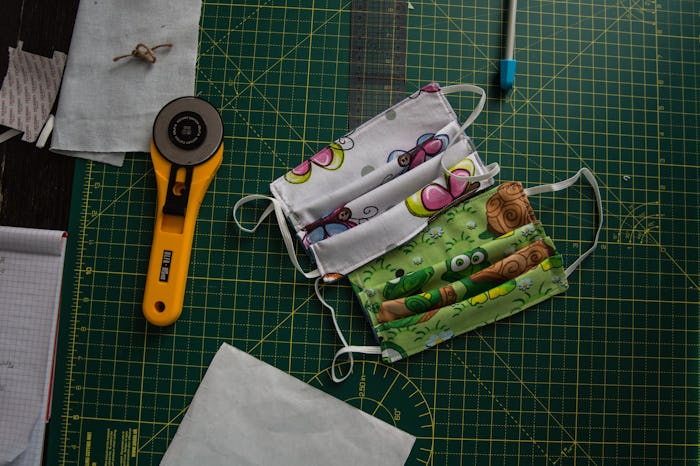News

The CDC Weighs In On How Often You Need To Wash Your Cloth Face Masks
Recent studies regarding asymptomatic carriers of the novel coronavirus have led the Centers for Disease Control and Prevention (CDC) to update its recommendations about wearing face coverings or masks in public. As a result, millions of people across the United States are now making their own cloth face coverings for when they need to venture out for supplies. But what's the best way to care for your new wardrobe stable and should you wash your face mask? According to the CDC, absolutely.
As part of its efforts to promote new recommendations regarding the use of cloth face coverings, the CDC rolled out a few "coronavirus face covering do's" Tuesday. Among them was a recommendation to wash any cloth face mask after each and every use. "Do make sure you can breathe through it," the federal agency said in a tweet. "Do wear it whenever going out in public. Do make sure it covers your nose and mouth and do wash after each use."
As for cleaning your cloth mask, the CDC says that "a washing machine should suffice." And while researchers have said water temperature doesn't matter when it comes to killing bacteria and germs, soap and a good lather remain crucial. So, be sure to include laundry soap when tossing cloth facial coverings or the cloth used to create no-sew masks into the wash.
Since updating its guidance on face masks, the CDC has continued to stress that surgical masks and N-95 respirator masks should be reserved for emergency first responders and healthcare and medical workers. For the general public, the CDC recommends the use of "simple cloth face coverings" such as those "fashioned from household items or made at home from common materials at low cost." To help people prepare a cloth face covering of their own, the federal agency has rolled out three tutorials for making masks at home, two of which require absolutely no sewing.
Although the CDC now recommends the use of cloth face coverings when in public places where social distancing measures may be hard to maintain, not everyone is advised to don a mask. "Cloth face coverings should not be placed on young children under age 2, anyone who has trouble breathing, or is unconscious, incapacitated, or otherwise unable to remove the cloth face covering without assistance," the CDC has said.
Additionally, it's important to practice removing your face covering without touching your eyes, nose, or mouth and get in the habit of immediately washing your hands with soap and water after taking it off and placing it in the wash. Furthermore, the use of cloth face coverings doesn't remove the need to continue practicing social distancing.
If you think you’re showing symptoms of coronavirus, which include fever, shortness of breath, and cough, call your doctor before going to get tested. If you’re anxious about the virus’s spread in your community, visit the CDC for up-to-date information and resources, or seek out mental health support. You can find all of Romper’s parents + coronavirus coverage here, and Bustle’s constantly updated, general “what to know about coronavirus” here.